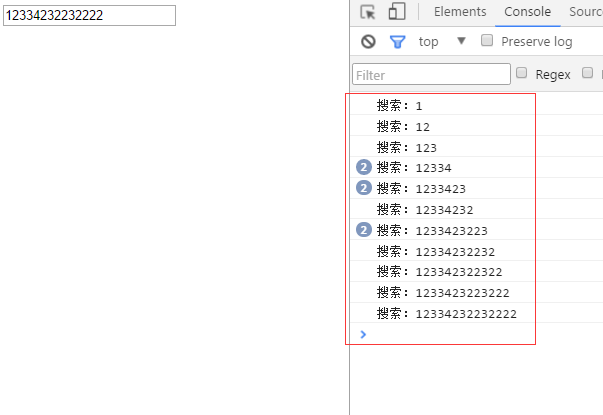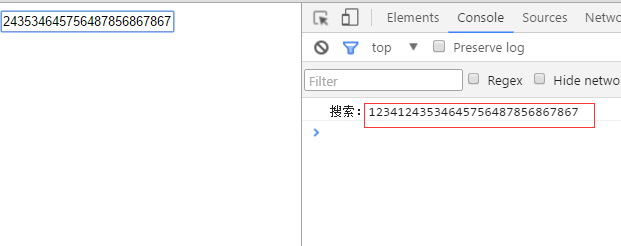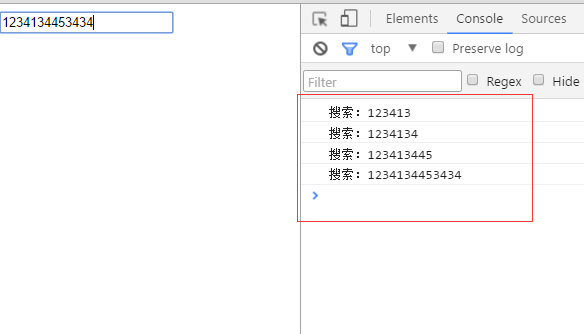Talk about function throttling in JS
The purpose of function throttling
It can be understood literally. Function throttling is used to throttle functions and optimize performance to a certain extent. For example, DOM operations are more efficient than non-DOM operations Interaction requires more memory and CPU time. Attempting to perform too many DOM-related operations in succession can cause the browser to hang and sometimes even crash. Especially using onresize in IE It is easy to happen when the event handler is used. When the browser is resized, the event will be triggered continuously. Inside the onresize event handler if you try to access the DOM operation, its high frequency of changes may crash the browser. For another example, for a common search function, we usually bind the keyup event and search every time the keyboard is pressed. But our purpose is mainly to search every time we enter some content. In order to solve these problems, you can use timers to throttle functions.
The principle of function throttling
Some codes cannot be executed continuously and repeatedly without interruption. The first time the function is called, a timer is created to run code after a specified interval. When the function is called a second time, it clears the previous timer and sets another one. If the previous timer has already been executed, this operation has no meaning. However, if the previous timer has not yet been executed, it is actually replaced with a new timer. The purpose is to execute the function only after the request to execute it has been stopped for some time.
Basic mode of function throttling
var processor = {
timeoutId: null,
//实际进行处理的方法
performProcessing: function(){
//实际执行的代码
},
//初始处理调用的方法
process: function(){
clearTimeout(this.timeoutId);
var that = this;
this.timeoutId = setTimeout(function(){
that.performProcessing();
}, 100);
}
};
//尝试开始执行
processor.process();Example scenario: Implementing common search functions
① Without using function throttling, bind the keyup event processing function to the input and output the content I input on the console.
Test main code:
<input id="search" type="text" name="search">
The result is as shown in the figure:

It can be seen that in this case, every time a keyboard key is pressed, it is output once. A short piece of content was output 14 times. If each time was an ajax query request, 14 requests would have been sent. The consumption in performance can be imagined.
②The case of using basic function throttling mode.
Test main code:
function queryData(text){
console.log("搜索:" + text);
}
var input = document.getElementById("search");
input.addEventListener("keyup", function(event){ queryData(this.value);
});
The results are as shown in the figure:
It can be seen that in this case, a lot of content was input and only output once, because the interval between two inputs was set to 500ms during the test. The actual application can be set according to the situation. Obviously, this has been greatly optimized in terms of performance. However, in this case, there is a new problem, as shown below:

Okay, maybe there is no clue. In fact, the problem is that if I keep typing and input a lot of content, but the interval between each two inputs is less than the delay value I set, then the queryData search function will never be called. In fact, what we prefer is that when a certain time value is reached, this search function must be executed once. Therefore, there is an improved model of function throttling.
③Function throttling enhanced version
Main code tested:
<input id="search" type="text" name="search">
function queryData(text){
console.log("搜索:" + text);
}
var input = document.getElementById("search");
input.addEventListener("keyup", function(event){
throttle(queryData, null, 500, this.value);
// queryData(this.value);
});
function throttle(fn,context,delay,text){
clearTimeout(fn.timeoutId);
fn.timeoutId = setTimeout(function(){
fn.call(context,text);
},delay);
}The test results are as shown in the figure:

Obviously, after continuous input, after a certain time interval, the queryData function will inevitably be called, but it is not called frequently. This achieves the purpose of saving money without affecting the user experience.
④Further optimization
If you go further, you can judge the input content before calling the throttle function. If the value is empty or the value remains unchanged, there is no need to call it again. I won’t go into details here.

Hot AI Tools

Undresser.AI Undress
AI-powered app for creating realistic nude photos

AI Clothes Remover
Online AI tool for removing clothes from photos.

Undress AI Tool
Undress images for free

Clothoff.io
AI clothes remover

Video Face Swap
Swap faces in any video effortlessly with our completely free AI face swap tool!

Hot Article

Hot Tools

Notepad++7.3.1
Easy-to-use and free code editor

SublimeText3 Chinese version
Chinese version, very easy to use

Zend Studio 13.0.1
Powerful PHP integrated development environment

Dreamweaver CS6
Visual web development tools

SublimeText3 Mac version
God-level code editing software (SublimeText3)

Hot Topics
 1387
1387
 52
52
 What should I do if I encounter garbled code printing for front-end thermal paper receipts?
Apr 04, 2025 pm 02:42 PM
What should I do if I encounter garbled code printing for front-end thermal paper receipts?
Apr 04, 2025 pm 02:42 PM
Frequently Asked Questions and Solutions for Front-end Thermal Paper Ticket Printing In Front-end Development, Ticket Printing is a common requirement. However, many developers are implementing...
 Who gets paid more Python or JavaScript?
Apr 04, 2025 am 12:09 AM
Who gets paid more Python or JavaScript?
Apr 04, 2025 am 12:09 AM
There is no absolute salary for Python and JavaScript developers, depending on skills and industry needs. 1. Python may be paid more in data science and machine learning. 2. JavaScript has great demand in front-end and full-stack development, and its salary is also considerable. 3. Influencing factors include experience, geographical location, company size and specific skills.
 Demystifying JavaScript: What It Does and Why It Matters
Apr 09, 2025 am 12:07 AM
Demystifying JavaScript: What It Does and Why It Matters
Apr 09, 2025 am 12:07 AM
JavaScript is the cornerstone of modern web development, and its main functions include event-driven programming, dynamic content generation and asynchronous programming. 1) Event-driven programming allows web pages to change dynamically according to user operations. 2) Dynamic content generation allows page content to be adjusted according to conditions. 3) Asynchronous programming ensures that the user interface is not blocked. JavaScript is widely used in web interaction, single-page application and server-side development, greatly improving the flexibility of user experience and cross-platform development.
 How to merge array elements with the same ID into one object using JavaScript?
Apr 04, 2025 pm 05:09 PM
How to merge array elements with the same ID into one object using JavaScript?
Apr 04, 2025 pm 05:09 PM
How to merge array elements with the same ID into one object in JavaScript? When processing data, we often encounter the need to have the same ID...
 How to achieve parallax scrolling and element animation effects, like Shiseido's official website?
or:
How can we achieve the animation effect accompanied by page scrolling like Shiseido's official website?
Apr 04, 2025 pm 05:36 PM
How to achieve parallax scrolling and element animation effects, like Shiseido's official website?
or:
How can we achieve the animation effect accompanied by page scrolling like Shiseido's official website?
Apr 04, 2025 pm 05:36 PM
Discussion on the realization of parallax scrolling and element animation effects in this article will explore how to achieve similar to Shiseido official website (https://www.shiseido.co.jp/sb/wonderland/)...
 The difference in console.log output result: Why are the two calls different?
Apr 04, 2025 pm 05:12 PM
The difference in console.log output result: Why are the two calls different?
Apr 04, 2025 pm 05:12 PM
In-depth discussion of the root causes of the difference in console.log output. This article will analyze the differences in the output results of console.log function in a piece of code and explain the reasons behind it. �...
 Is JavaScript hard to learn?
Apr 03, 2025 am 12:20 AM
Is JavaScript hard to learn?
Apr 03, 2025 am 12:20 AM
Learning JavaScript is not difficult, but it is challenging. 1) Understand basic concepts such as variables, data types, functions, etc. 2) Master asynchronous programming and implement it through event loops. 3) Use DOM operations and Promise to handle asynchronous requests. 4) Avoid common mistakes and use debugging techniques. 5) Optimize performance and follow best practices.
 Can PowerPoint run JavaScript?
Apr 01, 2025 pm 05:17 PM
Can PowerPoint run JavaScript?
Apr 01, 2025 pm 05:17 PM
JavaScript can be run in PowerPoint, and can be implemented by calling external JavaScript files or embedding HTML files through VBA. 1. To use VBA to call JavaScript files, you need to enable macros and have VBA programming knowledge. 2. Embed HTML files containing JavaScript, which are simple and easy to use but are subject to security restrictions. Advantages include extended functions and flexibility, while disadvantages involve security, compatibility and complexity. In practice, attention should be paid to security, compatibility, performance and user experience.




